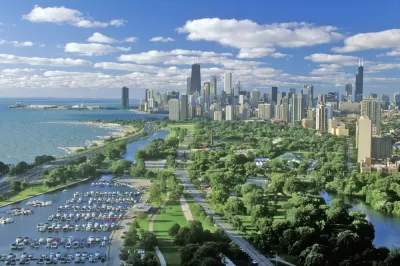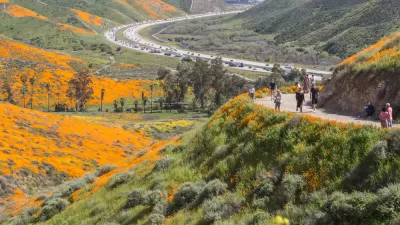New research shows that increasing park acreage in areas that face park deficits and low levels of tree canopy could lead to significant population-level increases in life expectancy.

"Parks Make Life Better" is a popular slogan used in the field of parks and recreation. It has been validated through numerous studies which demonstrate the many benefits of parks and how they indeed make life better for communities. Now new research conducted by UCLA in partnership with Prevention Institute and an advisory board of community-based organizations shows that parks can even help people live longer.
Specifically, the research offers the following findings:
- Increasing park acreage in areas that face park deficits and low levels of tree canopy could lead to significant population-level increases in life expectancy.
- Targeted investments in park infrastructure would significantly benefit the health of Latino and Black community members.
- This is especially important in communities, like South Los Angeles, where the median life expectancy is 77 years, which is well below the upper bound for the county as a whole. In Beverly Hills, less than 15 miles away, life expectancy is as high as 90 years—13 years longer.
- If all the census tracts in L.A. County expanded park access up to the county median, it could add up to 164,700 years in life-expectancy gains for residents living in park-poor tracts. Latino and Black community residents comprise almost 72 percent of the gain (118,000 years).
Written by Elva Yañez of Prevention Institute, this article further identifies various actions that should be taken to address park inequities. Examples include: developing new policies and practices and reforming existing ones to prioritize investments in communities experiencing the greatest park deficits; evaluating agency policies and initiatives to assess their impact to reverse or reinforce park inequities and make corrections as necessary; and engaging with and listening to people living in low-income communities of color that have been historically excluded from park-related decision making.
FULL STORY: More Parks, Longer Lives

Planetizen Federal Action Tracker
A weekly monitor of how Trump’s orders and actions are impacting planners and planning in America.

Chicago’s Ghost Rails
Just beneath the surface of the modern city lie the remnants of its expansive early 20th-century streetcar system.

San Antonio and Austin are Fusing Into one Massive Megaregion
The region spanning the two central Texas cities is growing fast, posing challenges for local infrastructure and water supplies.

Since Zion's Shuttles Went Electric “The Smog is Gone”
Visitors to Zion National Park can enjoy the canyon via the nation’s first fully electric park shuttle system.

Trump Distributing DOT Safety Funds at 1/10 Rate of Biden
Funds for Safe Streets and other transportation safety and equity programs are being held up by administrative reviews and conflicts with the Trump administration’s priorities.

German Cities Subsidize Taxis for Women Amid Wave of Violence
Free or low-cost taxi rides can help women navigate cities more safely, but critics say the programs don't address the root causes of violence against women.
Urban Design for Planners 1: Software Tools
This six-course series explores essential urban design concepts using open source software and equips planners with the tools they need to participate fully in the urban design process.
Planning for Universal Design
Learn the tools for implementing Universal Design in planning regulations.
planning NEXT
Appalachian Highlands Housing Partners
Mpact (founded as Rail~Volution)
City of Camden Redevelopment Agency
City of Astoria
City of Portland
City of Laramie




























